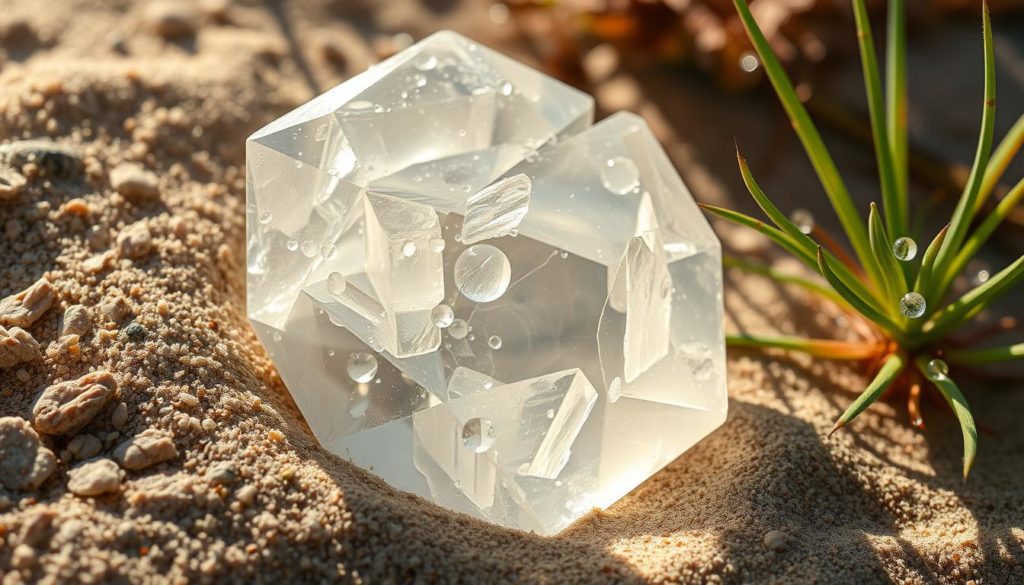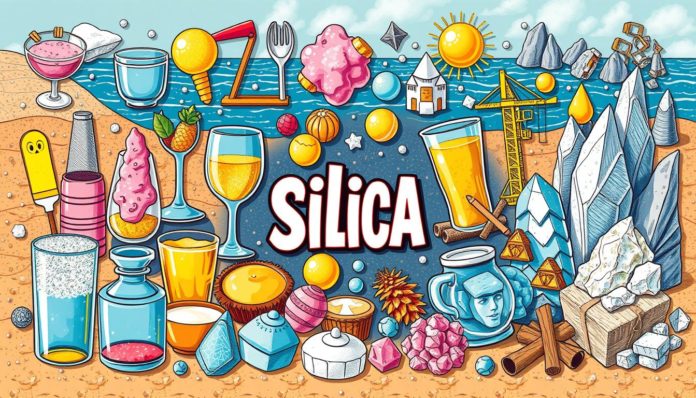Welcome to the fascinating world of silica. This mineral plays a big role in our daily lives. It’s found in health care, beauty products, and many industries.
Silica boosts our bone health and improves skincare routines. It also plays a key part in building infrastructure and making consumer products. Let’s discover how silica improves our lives in so many ways.
What is Silica?
Silica is a common mineral on Earth’s surface. It combines silicon and oxygen, called silicon dioxide (SiO2). It’s key in many fields and places, worth learning about.

The Chemical Composition of Silica
The basis of silica is its SiO2 formula. It merges silicon and oxygen. Silica is found as crystalline or non-crystalline.
Quartz is its well-known crystalline form, seen in rocks and sands. Other types include tridymite and cristobalite. Exploring silica’s makeup is crucial in industrial and environmental science.
Naturally Occurring Silica Sources
Silica is everywhere, in many rocks like sandstone and granite. It’s in clays, rivers, lakes, and oceans too.
Its everywhere presence shows its role in nature and human uses. Knowing where silica comes from helps its use in many fields, like construction and water cleaning.
Silica Benefits for Overall Health
Silica is essential for our body’s overall health. It helps in many key functions. For example, it can improve bone health, support joint function, and boost the immune system.
Improving Bone Health
Silica greatly benefits our bones. It prevents bone problems and helps build them up. With silica, our bones get denser and minerals are added well. This makes our bones strong and healthy. It’s especially important for people vulnerable to osteoporosis and other bone diseases.
Supporting Joint Function
Silica also helps keep our joints working well. It maintains healthy joints and cartilage, reduces swelling, and increases flexibility. For those with arthritis or joint issues, silica can ease pain and stiffness. Adding silica supplements regularly is a good idea for joint health.

Boosting Immune System
Silica boosts our immune system, too. It supports cell function and repairs tissues. This helps fend off infections and speeds up recovery from sickness. By taking silica regularly, you can strengthen your immune defense. This keeps you healthier all year round.
Silica in Skincare
Silica, a remarkable mineral, is making waves in the skincare world. It boosts the skin’s strength and gives it a smooth, soft feel. This makes it a key part of many skincare products.
Benefits for Skin Health
Silica plays a big role in making skin elastic. It helps create more collagen, keeping the skin tight and reducing sag. It also helps heal blemishes and small cuts well.
Anti-Aging Properties
Silica is great at cutting down on wrinkles and fine lines. It ups collagen creation, fighting the signs of aging. This leaves the skin looking younger and more lively.
Application in Skincare Products
Silica is used a lot in skincare. You can find it in moisturizers, primers, and more because it can soak up oil without blocking pores. It’s key for keeping the skin moist yet matte, a must-have in beauty kits.
| Product Type | Primary Benefits | Example Brands |
|---|---|---|
| Moisturizers | Hydration, Oil Control | Neutrogena, Olay |
| Primers | Smooth Finish, Pore Minimization | Smashbox, Benefit Cosmetics |
| Anti-Aging Serums | Reduction of Wrinkles, Firming | L’Oréal, Estée Lauder |
Silica Supplements: What You Need to Know
As more people focus on health, silica supplements are getting popular. This guide covers the types of silica supplements, their dosages, and side effects.
Types of Silica Supplements
Silica supplements come in forms like horsetail extract, bamboo extract, and orthosilicic acid. Horsetail extract boosts hair and nail health. Bamboo extract is high in silica. Orthosilicic acid absorbs better than natural sources.
Recommended Dosage and Usage
The right recommended dosage of silica depends on the supplement form and health needs. Typically, it ranges from 5 mg to 40 mg daily. Always follow expert guidelines to avoid taking too much.
Potential Side Effects and Safety Concerns
Silica side effects can vary from stomach upset to kidney stones. Very high amounts can hurt your kidneys. Talk to a doctor before starting any supplement to stay safe.
| Type of Silica Supplement | Natural Source | Recommended Dosage |
|---|---|---|
| Horsetail Extract | Equisetum arvense | 5-10 mg/day |
| Bamboo Extract | Bambusa vulgaris | 10-20 mg/day |
| Orthosilicic Acid | Synthetic | 20-40 mg/day |
Common Uses of Silica in Everyday Products
Silica is an important part of many everyday items. It has many benefits and uses. Let’s explore how silica is used in personal care, industry, and food and drinks.
Silica in Personal Care Products
Silica is very common in personal care items. For example, it’s in toothpaste to help clean teeth by removing plaque and stains. Also, it’s in bath products like scrubs and exfoliants because it’s good at scrubbing gently.
Industrial Applications of Silica
Silica has many uses in different industries. It is essential in glass making, adding hardness and transparency. In ceramics, silica helps make products durable and well-finished. Also, it’s used in building materials to make them stronger and last longer.
Silica in Food and Beverages
In the food industry, silica is used for important reasons. It keeps powdered products like spices and coffee creamers from clumping. Silica is also found in drinks, helping them stay clear and stable.
Silica Properties and Its Impact on the Environment
Silica is a common mineral made of silicon and oxygen. It’s found all over the Earth’s crust. Its unique silica properties like hardness and thermal stability are very useful in many industries. Yet, it’s important to know how silica affects the environment to use it wisely.
Mining silica can harm the environment in big ways. It can destroy natural habitats, pollute water, and dirty the air. These issues call for tight rules and responsible mining to lessen the damage. Visit this link to learn more about the environmental effects of silica.
It’s now more critical to mine and use silica without harming our planet. Many are trying to find less harmful ways to get and use silica. This includes talking with local communities, and using better, green tech. All these efforts aim to keep the planet safe while making use of silica.
Creating sustainable options is key. This means finding new ways to use silica that don’t harm the environment. By focusing on research and new ideas, industries can use silica in a smart and eco-friendly way.
It’s all about finding the right balance. Using silica’s benefits while cutting down its environmental harm is essential. As we understand more about its effects, our commitment to protect the earth grows. This way, we can continue to enjoy silica’s advantages and keep our planet safe for everyone in the future.
How to Choose the Right Silica Supplement
Choosing the right silica supplement is key to good health. Yet, deciding which one is best can be hard. Think about certain factors to make sure you choose a quality and effective supplement.
Factors to Consider
When looking at silica supplements, focus on three things:
- Purity: Pick a supplement that has pure silica. Avoid those with harmful fillers or contaminants.
- Origin: Choose silica that comes from natural, trustworthy sources. Natural sources improve how well your body can use the silica. Silicium Laboratories has an organic silica formula that is well-known for its high quality.
- Bioavailability: Make sure your body can easily absorb the silica. Supplements that are more bioavailable give you the best results.
Considering these key factors will help you make a smart choice in selecting your silica supplement.
Reviews and Recommendations
Reading product reviews provides insights into what others think and feel. Search for reviews that talk about how easy the product is to use, its benefits, and any side effects. Many experts suggest choosing supplements like those from Silicium Laboratories for their balanced silica.
In brief, knowing what to look for in silica supplements and checking reviews helps a lot. For further help in picking the right one, consult a comprehensive guide.
| Factor | Description | Examples |
|---|---|---|
| Purity | High-quality, contaminant-free silica | Silicium Laboratories |
| Origin | Sourced from reliable, natural environments | Organic silica |
| Bioavailability | Efficiently absorbed by the body | Silicium Laboratories formula |
| Reviews | Consumer experiences and expert insights | Health forums, expert blogs |
Silica Safety Concerns: What You Need to Be Aware Of
It’s vital to understand *silica safety concerns*, especially in high-exposure industries. Respirable crystalline silica can cause serious health problems if not handled right.
Managing silica risks starts with knowing the dangers. Risks include lung diseases like silicosis, from inhaling fine silica dust.
Preventing these risks involves strict exposure rules. In the U.S., OSHA sets exposure limits to keep workers safe. Following these rules helps reduce exposure and ensures a safe workplace.
- Using wet cutting methods to reduce dust.
- Implementing local exhaust ventilation systems.
- Providing personal protective equipment (PPE) such as N95 respirators.
- Conducting regular monitoring of air quality within the workplace.
Knowing the signs of silica-related diseases is key. Symptoms range from shortness of breath to chronic cough. In worst cases, it can cause lung fibrosis. Regular health checks are critical for early detection and prevention.
Here’s a detailed look at silica safety measures:
| Measure | Details |
|---|---|
| Wet Cutting Methods | Reduces airborne silica dust by applying water during cutting processes. |
| Local Exhaust Ventilation | Captures and removes silica dust at the source through ventilation systems. |
| Personal Protective Equipment | Includes respirators (e.g., N95) designed to filter out fine silica particles. |
| Air Quality Monitoring | Regular testing of workplace air to ensure compliance with safety standards. |
| Health Screenings | Periodic medical check-ups to detect early symptoms of silica-related diseases. |
Future Prospects and Research on Silica
The world of silica research is alive with new developments. These advances show promise for many areas. Scientists are looking into silica’s use in nanotechnology and biomedical engineering. One exciting area is how silica nanoparticles could change drug delivery for diseases like cancer. This could make treatments more targeted and effective.
Research is also focusing on silica’s environmental impacts. Some silica forms might help clean pollutants from water. This points to how silica can support environmental health and pollution reduction.
The study of silica is also touching on electronics and renewable energy. Experts are exploring its use in better photovoltaic cells. This could boost solar energy tech. Silica’s ongoing advancements may soon make it key in clean energy, ensuring a sustainable future.
FAQ
What is silica and what are its everyday uses?
Silica, or silicon dioxide (SiO2), is a common mineral found in quartz and more. It is used in many fields, from health supplements to building materials to skincare.
What are the primary sources of silica?
You can find silica in materials like sandstone and granite, plus clays and natural waters. It’s also taken from quartz for various uses.
How does silica benefit bone health?
Silica helps with bone growth and wards off bone diseases. It makes sure our bodies can use calcium and other vital minerals for bones.
Can silica help with joint function?
Yes, it supports healthy joints and cartilage. This helps lessen pain and makes movement easier.
What role does silica play in the immune system?
Silica boosts the immune system, helping our bodies fight off sickness and infection.
How does silica benefit skin health?
It keeps skin flexible and helps in healing. Silica is also in many skincare products because it can soak up substances.
Does silica have anti-aging properties?
Yes, silica helps smooth out wrinkles and fine lines. That’s why it’s a key ingredient in products that fight aging.
What types of silica supplements are available?
You can find silica supplements as horsetail extract and orthosilicic acid. Each has its own benefits.
What is the recommended dosage for silica supplements?
The right dose can vary, but it’s best to follow the advice of health experts and the supplement maker.
Are there any side effects or safety concerns with silica supplements?
Silica is mostly safe, but taking too much can be harmful. Always talk to a healthcare provider before trying any supplement.
How is silica used in personal care products?
In personal care items, silica is used for its scrubbing and soaking abilities. It’s in things like toothpaste, lotions, and bath products.
What industrial applications does silica have?
Silica is key for making items like glass, ceramics, and concrete. It also plays a role in electronics and paint production.
Is silica used in food and beverages?
Yes, as an anti-caking agent in foods and to improve the look and stability of some drinks.
What are the environmental impacts of silica mining?
Mining silica can hurt the environment, but sustainable practices are reducing that harm.
What should I consider when choosing a silica supplement?
Look for supplements that are pure and come from trusted sources. Also, consider how well your body can absorb it. Tips from health pros can help too.
What are the safety concerns around silica exposure?
Exposure to fine silica dust can cause serious lung problems. It’s crucial to follow safety measures, especially at work.
What is the future of silica research?
Researchers are finding new uses for silica in tech, healthcare, and eco-friendly solutions. It’s an exciting field with lots of potential.


